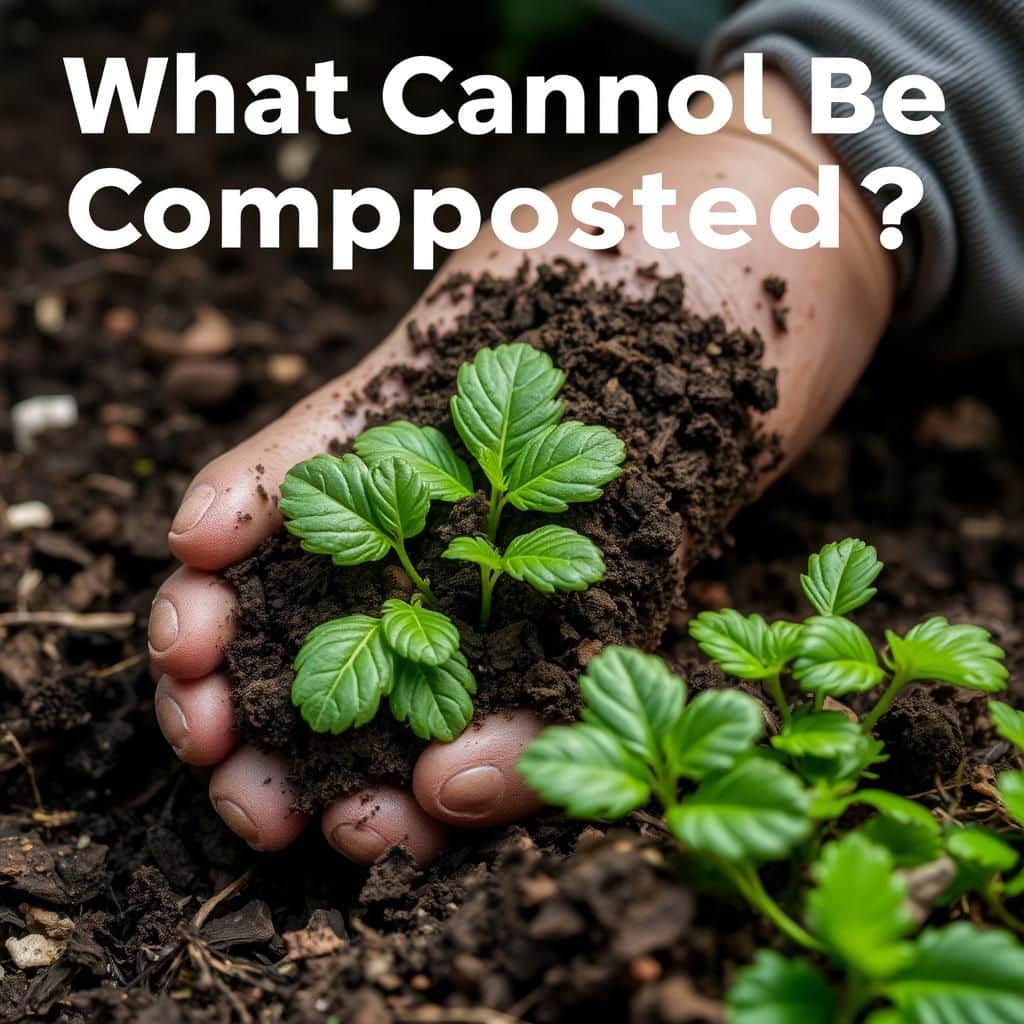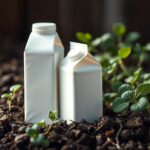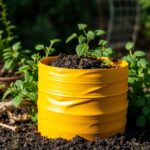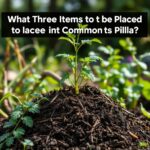What Cannot Be Composted? A Comprehensive Guide to Composting Mistakes

Composting is an eco-friendly practice that transforms kitchen scraps and yard waste into nutrient-rich soil. However, not all materials are suitable for composting, and using the wrong ones can lead to unpleasant odors, disease, and ineffective compost. This comprehensive guide explores common mistakes in composting, focusing on items that should never be added to your compost pile. By understanding what cannot be composted, you will not only enhance the quality of your compost but also contribute to a healthier environment. Discover the best practices for maintaining a successful compost system while avoiding the pitfalls that can derail your efforts.
What Cannot Be Composted?
Composting is a beneficial practice that enriches soil and reduces waste, but not everything can be added to a compost pile. Items that should be avoided include meat, dairy, oils, and processed foods, as these materials can attract unwanted pests and create unpleasant odors. Additionally, items like plastic, glass, and metal do not decompose, and adding them to compost can contaminate the mixture and hinder the composting process. It's essential to know what is unsuitable for composting to maintain an effective and healthy compost system.
Animal Products
Animal products, such as meat, dairy, and eggs, should not be included in compost because they carry a higher risk of attracting pests like rodents and insects. They can also produce offensive odors as they break down, complicating the composting process. Furthermore, these items can create pathogens that linger in the compost if not processed at high temperatures, potentially contaminating the finished compost.
Oils and Fats
Oils and fats, including cooking oil and butter, should be omitted from compost piles due to their tendency to create a greasy mass that inhibits aeration and prevents proper decomposition. These substances can also attract pests and lead to unpleasant smells, making the composting environment less hospitable for beneficial microorganisms that help break down organic matter.
Processed Foods
Processed foods, such as snacks, sugary items, and packaged meals, often contain preservatives and additives that resist decomposition. These ingredients may disrupt the microbial balance in the compost pile and hinder the breakdown of organic materials, leading to a less effective composting process. In addition, their inclusion may introduce unwanted chemicals into the final compost product.
See also:
Non-Biodegradable Materials
Non-biodegradable materials, such as plastic, glass, and metal, should be strictly avoided in composting as they do not break down and can contaminate the compost. These materials can disrupt the natural decomposition process and create a mixture that is unsuitable for enriching soil. It is crucial to dispose of these items through appropriate recycling methods rather than attempting to compost them.
Diseased Plants and Weeds
Infected plants and weeds should not be composted as they can harbor diseases and pests that may survive the composting process. If these materials are added to the compost pile, they risk reintroducing detrimental elements to your garden when the compost is applied. It’s better to dispose of these items through municipal green waste programs or burning, depending on local regulations.
| Item | Reason for Exclusion |
|---|---|
| Meat | Attracts pests and produces odors |
| Dairy | Similar issues with pests and odors |
| Oils | Inhibits aeration and attracts pests |
| Processed Foods | Contains preservatives that disrupt decomposition |
| Non-Biodegradable Materials | Do not break down and contaminate compost |
Common Misconceptions About Compostable Materials
When it comes to composting, many people hold misconceptions about what can and cannot be included in their compost piles. Understanding the true nature of compostable materials is essential to maintaining a healthy composting system and ensuring the process is effective. For example, some organic waste, like meat and dairy, while technically biodegradable, attract pests and produce undesirable odors, making them poor candidates for home composting. Similarly, items such as treated wood and coal ash release harmful chemicals into the compost, which can compromise the soil health in your garden. Therefore, recognizing what should be kept out of your compost is crucial for successful composting.
Meat and Dairy Products
Including meat and dairy in compost can lead to a range of problems, from attracting unwanted pests like rats and raccoons to creating unpleasant odors during decomposition. These products break down unevenly and may harbor pathogens and diseases, making them unsuitable for backyard compost bins. Instead, consider using alternative methods, such as specialized vermicomposting systems that can handle these materials more effectively, ensuring your compost remains healthy and pest-free.
Pesticide-treated Plants
Plants that have been treated with pesticides or herbicides can introduce toxic chemicals into the compost, which can then be absorbed by future crops grown in that soil. It is essential to refrain from composting clippings or other plant materials that have been recently treated with any synthetic chemicals, as this could lead to contamination of the compost and subsequently, of the garden produce. Using organic gardening practices can help eliminate this concern and promote a safer composting environment.
See also:
Coal Ash and Charcoal
While it may seem like a natural choice, coal ash and burned charcoal should rarely be included in compost due to their potential to contain harmful heavy metals and other toxins. These substances not only fail to provide beneficial nutrients for your compost but can also lead to the acidification of the soil and negatively impact plant growth. If you have ash from wood, however, it can be used in small amounts as a soil amendment, but it’s essential to ensure that it comes from untreated, clean wood.
Oils and Fats
The introduction of oils and fats into your compost pile can create serious issues. These substances tend to clump together and create a barrier that prevents airflow and moisture penetration, slowing down the composting process significantly. Additionally, like meat and dairy, oils can attract unwanted pests to your compost bin. To maintain compost health, it's best to keep these materials separate and utilize them in other waste disposal methods, such as grease disposal services offered in many communities.
Diseased Plants
Composting diseased plants can be highly problematic, as the pathogens responsible for the diseases may remain active even after the composting process. This can result in the spread of diseases to healthy plants in the garden when the compost is applied. To prevent this issue, it’s advisable to dispose of any diseased plant material in the trash or through municipal yard waste programs that can safely handle such items. By being diligent about this, you can help create a thriving garden ecosystem free from the risks associated with disease transmission.
Questions from Our Readers
What items should never be composted?
It is essential to avoid composting items like meat, dairy products, and oils, as they can attract pests and create odors. Additionally, diseased plants and weeds with seeds should also be omitted, as they can survive the composting process and spread.
Can I compost paper products?
While some paper products are safe to compost, you should avoid glossy or coated paper, such as magazines and advertisements, due to harmful chemicals. Instead, focus on using uncoated, plain paper and cardboard as they break down easily and enrich the compost.
See also:
Are there any types of food scraps I shouldn't compost?
Certain food scraps like citrus fruits, garlic, and onions can be detrimental to your compost because they may create an acidic environment or repel beneficial organisms. It's best to use vegetable scraps that are less likely to affect the compost balance.
Is it safe to compost pet waste?
Composting cat litter and dog waste is generally discouraged, as these materials can contain harmful pathogens. Instead, you can use specialized composting systems designed for pet waste to ensure safety and hygiene in the composting process.

If you want to read more articles like What Cannot Be Composted? A Comprehensive Guide to Composting Mistakes, we recommend you check out our Compost category.
Leave a Reply
Related Articles